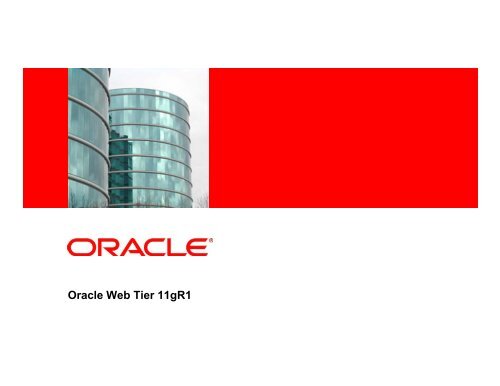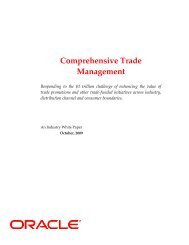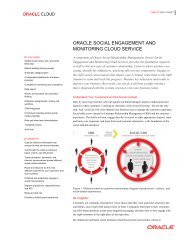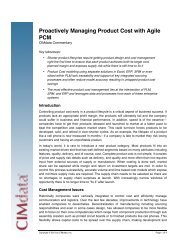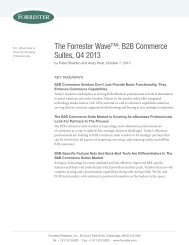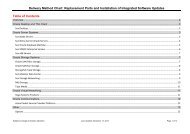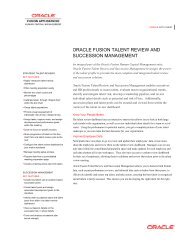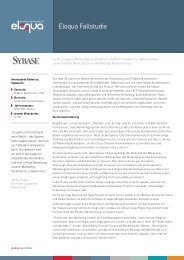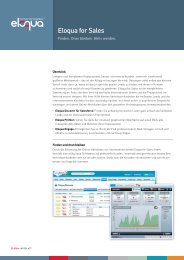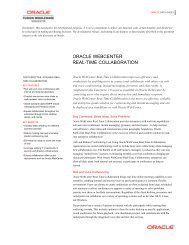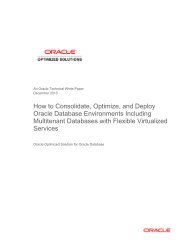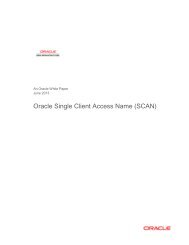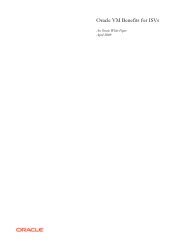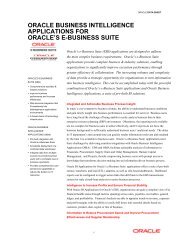Oracle Web Tier 11gR1
Oracle Web Tier 11gR1
Oracle Web Tier 11gR1
You also want an ePaper? Increase the reach of your titles
YUMPU automatically turns print PDFs into web optimized ePapers that Google loves.
<strong>Oracle</strong> <strong>Web</strong> <strong>Tier</strong> <strong>11gR1</strong>
Agenda<br />
• What's New<br />
– What's New in <strong>Oracle</strong> <strong>Web</strong> Cache and OHS<br />
– <strong>Oracle</strong> <strong>Web</strong> Cache and OHS Bundling<br />
• <strong>Web</strong> <strong>Tier</strong> Installation Concepts and Options<br />
– Separation of Config from Binaries<br />
– <strong>Oracle</strong> <strong>Web</strong> Cache and OHS Directory Structure<br />
– Provisioning Using opmnctl<br />
• Management Tools for <strong>Web</strong> <strong>Tier</strong><br />
– Fusion Middleware Control<br />
– Opmnctl<br />
– <strong>Web</strong> Cache Manager<br />
• Verifying Ports in Use
What is <strong>Oracle</strong> <strong>Web</strong> <strong>Tier</strong><br />
• The web tier is:<br />
– Responsible for interacting with the end user<br />
• Primarily in the forms of HTTP requests and responses<br />
– The outermost tier in the application server<br />
• <strong>Oracle</strong> <strong>Web</strong> <strong>Tier</strong> comprises of two components:<br />
– <strong>Oracle</strong> <strong>Web</strong> Cache<br />
• A content-aware server accelerator, secure reverse proxy<br />
server that improves the performance, scalability, and<br />
availability of web sites<br />
– <strong>Oracle</strong> HTTP Server<br />
• Apache based web server that provides a HTTP listener for<br />
<strong>Oracle</strong> <strong>Web</strong>Logic Server and the framework for hosting static<br />
pages, dynamic pages, and applications over the web
What’s New in <strong>Oracle</strong> <strong>Web</strong> Cache <strong>11gR1</strong><br />
• Request filtering<br />
– Prevent malicious code from exploiting software vulnerabilities<br />
– Take actions on incoming requests based on request attributes<br />
• Invalidation using response headers<br />
– Invalidate cached content through an HTTP response header<br />
• Request-based logging<br />
– Writes requests in bulk after the request to the event logs<br />
• ODL format for event logs<br />
– Uses ODL format for all diagnostic messages and log files<br />
• Audit logging<br />
– Supports the Common Audit Framework for administering audits<br />
across FMW components<br />
• Secure caching<br />
– Supports caching contents that are secured by OSSO authentication<br />
• Can be configured using MBeans
What’s New in <strong>Oracle</strong> HTTP Server <strong>11gR1</strong><br />
• Now based on Apache v2.2<br />
• Comes integrated with WLS Plug-in for routing to WLS<br />
– Tested with WLS 10.3.1 but should work with any version<br />
• Can be configured using MBeans<br />
• ODL format for event logs<br />
– Uses ODL format for all diagnostic messages and log files<br />
• Audit logging<br />
– Supports the Common Audit Framework for administering audits<br />
across FMW components<br />
• Does not support routing to OC4J<br />
– Mod_oc4j is no longer shipped and supported<br />
• Does not come with PHP anymore<br />
– Mod_php is still support but is not bundled with OHS<br />
– Instructions to integrate PHP with OHS available here:<br />
• http://www.oracle.com/technology/products/ias/ohs/htdocs/php_ohs.htm
<strong>Oracle</strong> <strong>Web</strong> Cache and OHS Bundling<br />
• <strong>Oracle</strong> <strong>Web</strong> Cache and OHS <strong>11gR1</strong> available from two FMW packages<br />
• <strong>Oracle</strong> Fusion Middleware <strong>Web</strong> <strong>Tier</strong> and Utilities DVD<br />
– Primary source to obtain OHS and <strong>Web</strong> Cache<br />
– Installed and configured independent of other components<br />
• Choice of associating (for mgmt via EM) with any WLS domain<br />
– mod_plsql and mod_osso are disabled OOTB (can be enabled)<br />
• <strong>Oracle</strong> Portal, Forms, Reports and Discoverer DVD<br />
– Some of these components have dependency on WC and OHS<br />
– Installed and configured automatically<br />
• Auto associated (for mgmt via EM) with WLS domain configured for this<br />
package<br />
– Can not install just WC or OHS out of this package<br />
– Can create additional WC and OHS components post install<br />
– mod_plsql and mod_osso are enabled and configured OOTB
Agenda<br />
• What's New<br />
– What's New in <strong>Oracle</strong> <strong>Web</strong> Cache and OHS<br />
– <strong>Oracle</strong> <strong>Web</strong> Cache and OHS Bundling<br />
• <strong>Web</strong> <strong>Tier</strong> Installation Concepts and Options<br />
– Separation of Config from Binaries<br />
– <strong>Oracle</strong> <strong>Web</strong> Cache and OHS Directory Structure<br />
– Provisioning Using opmnctl<br />
• Management Tools for <strong>Web</strong> <strong>Tier</strong><br />
– Fusion Middleware Control<br />
– Opmnctl<br />
– <strong>Web</strong> Cache Manager<br />
• Verifying Ports in Use
Separation of Config from Binaries<br />
• Separation of Config from Binaries<br />
– Unlike prior releases where binaries and config stayed together<br />
• Two key terms:<br />
– <strong>Oracle</strong> Home (read only files)<br />
• Binaries and other files created at install time and never<br />
changes<br />
• Location represented by ORACLE_HOME env. variable<br />
– <strong>Oracle</strong> Instance (updateable files)<br />
• A collection of system components managed by OPMN<br />
• Contains configuration files, log files, static contents, temp<br />
files<br />
• Location represented by ORACLE_INSTANCE env. variable
Multiple <strong>Oracle</strong> Instances per <strong>Oracle</strong> Home<br />
• Can create multiple <strong>Oracle</strong> Instances per <strong>Oracle</strong> Home<br />
<strong>Oracle</strong> Instance<br />
<strong>Web</strong><br />
Cache<br />
OHS<br />
Instance<br />
Home<br />
Config<br />
Cache<br />
<strong>Oracle</strong> Instance<br />
OHS<br />
OHS<br />
Instance<br />
Home<br />
Config<br />
Cache<br />
OPMN<br />
Logs<br />
OPMN<br />
Logs<br />
<strong>Oracle</strong><br />
Home<br />
Binaries, Read Only Files
<strong>Web</strong> <strong>Tier</strong> <strong>Oracle</strong> Instance<br />
• A web tier <strong>Oracle</strong> Instance contains<br />
– One OPMN<br />
– 0 or more system components (such as OHS and <strong>Web</strong><br />
Cache)<br />
• OPMN manages all system components of an <strong>Oracle</strong><br />
Instance<br />
OHS1<br />
<strong>Web</strong> <strong>Tier</strong> Instance<br />
OPMN<br />
OHS2<br />
<strong>Web</strong>Cache1
<strong>Web</strong> <strong>Tier</strong> Installation Options<br />
• Installation and configuration can be done separately<br />
– Install Only (DVD/Disk1/runInstaller)<br />
• Installs the product binaries in an <strong>Oracle</strong> Home<br />
• All component binaries from the package are installed<br />
– Install and Configure (DVD/Disk1/runInstaller)<br />
• Installs the product binaries in an <strong>Oracle</strong> Home<br />
– All component binaries from the package are installed<br />
• Creates and configures an instance in an <strong>Oracle</strong> Instance<br />
– Choose what components get configured<br />
– Configure Only ($ORALE_HOME/bin/config.sh)<br />
• Creates and configures an instance in an <strong>Oracle</strong> Instance<br />
– Choose what components get configured
<strong>Web</strong> <strong>Tier</strong> Installation Options Cont.<br />
• Associating <strong>Oracle</strong> Instance with WLS domain<br />
– Two options to configure a web tier <strong>Oracle</strong> Instance<br />
– Associate with WLS domain<br />
• Allows system components to be managed via EM<br />
• A (JRF enabled) WLS domain needs to be pre-configured<br />
– Deploys system components’ MBeans in Admin Server<br />
• Also loosely referred as “EM managed” mode<br />
• Does NOT configure OHS to route requests to that WLS<br />
domain<br />
– Do not associate with WLS domain<br />
• Can not manage system components via EM<br />
• Components can still be managed via CLI (opmnctl)<br />
• Also loosely referred as “non-EM managed” mode
General <strong>Web</strong> <strong>Tier</strong> Install Flow<br />
• Go directly to step #5 if:<br />
– If you already have a JRF-enabled WLS domain configured, or<br />
– Do not want to manage web tier instance via FMW Control<br />
1. Install WLS:<br />
– Create a new MW Home<br />
– Choose "Typical" install option<br />
2. Install SOA or <strong>Web</strong> Center Suite:<br />
– Run /Disk1/runInstaller.sh<br />
– For JDK location you could provide JDK from above WLS install<br />
(/jdk160_11)<br />
3. Configure WLS Domain and EM (from SOA or <strong>Web</strong> Center <strong>Oracle</strong><br />
Home):<br />
– Run /common/bin/config.sh<br />
– Create a new domain (choose "Create a new <strong>Web</strong>logic Domain")<br />
– Select only EM and JRF to configure
General <strong>Web</strong> <strong>Tier</strong> Install Flow Cont.<br />
4. Start WLS Admin Server<br />
– Run /bin/start<strong>Web</strong>Logic.sh<br />
5. Install and Configure <strong>Web</strong><strong>Tier</strong><br />
– Run /Disk1/runInstaller.sh<br />
– Choose Install and Configure option<br />
– Select both OHS and <strong>Web</strong> Cache components<br />
– If configuring instance to be managed via FMW Control:<br />
• Select "Associate Selected Components with <strong>Web</strong>Logic Domain"<br />
• Provide WLS Admin Server details (domain that you created in #3<br />
above
Middleware Home Directory Structure<br />
Middleware Home<br />
<strong>Web</strong> <strong>Tier</strong> <strong>Oracle</strong> Home WLS Home User Projects SOA Home<br />
Domains<br />
<strong>Oracle</strong> Instance<br />
OHS<br />
EM Domain<br />
<strong>Web</strong> Cache<br />
Admin Server<br />
soa_server1<br />
* This is one of the many possible combinations for MW home directory structure
<strong>Web</strong> Cache Directory Structure - <strong>Oracle</strong> Home<br />
Directory<br />
webcache/bin<br />
webcache/tem<br />
plates<br />
webcache/files<br />
Contents<br />
• <strong>Web</strong> Cache binary files<br />
• For example, webcached and webcachea<br />
• <strong>Web</strong> Cache template configuration files<br />
• For example, webcache.xml, auditconfig.xml etc.<br />
• Get provisioned to an <strong>Oracle</strong> instance at WC creation<br />
• These files should only be edited by advanced users<br />
• <strong>Web</strong> Cache template static files<br />
• For example, error pages<br />
• Get provisioned to an <strong>Oracle</strong> instance at WC creation<br />
• These files should only be edited by advanced users
<strong>Web</strong> Cache Directory Structure - <strong>Oracle</strong> Instance<br />
Directory<br />
bin<br />
config/<strong>Web</strong>Cache/<<br />
webcache_name><br />
config/<strong>Web</strong>Cache/<<br />
webcache_name><br />
/files<br />
diagnostics/logs/We<br />
bCache/<br />
Contents<br />
• opmnctl executable for the instance<br />
• <strong>Web</strong> Cache configuration files<br />
• For webcache.xml, auditconfig.xml etc.<br />
• Static content<br />
• For example, error pages<br />
• Log files<br />
• For example, event log, access log and console log
OHS Directory Structure - <strong>Oracle</strong> Home<br />
Directory<br />
ohs/bin<br />
ohs/conf<br />
ohs/htdocs<br />
ohs/modules<br />
Contents<br />
• OHS binary files<br />
• For example, apachectl, rotatelogs, httpd, apxs etc.<br />
• OHS template configuration files<br />
• For example, httpd.conf, ssl.conf, mod_wl_ohs.conf etc.<br />
• Get provisioned to an <strong>Oracle</strong> instance at OHS creation<br />
• These files should only be edited by advanced users<br />
• OHS template static files<br />
• For example, welcome pages, error docs etc.<br />
• Get provisioned to an <strong>Oracle</strong> instance at OHS creation<br />
• These files should only be edited by advanced users<br />
• Modules .so files<br />
• For example, mod_wl_ohs.so, mod_osso.so etc.
OHS Directory Structure - <strong>Oracle</strong> Instance<br />
Directory<br />
bin<br />
config/OHS/<br />
config/OHS//htdocs<br />
config/OHS//moduleconf<br />
diagnostics/logs/OH<br />
S/<br />
Contents<br />
• opmnctl executable for the instance<br />
• OHS configuration files<br />
• For example, httpd.conf, mod_wl_ohs.conf, ssl.conf<br />
etc.<br />
• Static content and CGI scripts<br />
• For example, welcome pages, error docs etc.<br />
• Configuration files that get automatically included<br />
• Don’t put any files with a .conf extension here that<br />
shouldn’t be included<br />
• Log files<br />
• For example, error log, access log and console log
Provisioning Using opmnctl<br />
• Use opmnctl to provision <strong>Oracle</strong> Instances and system components<br />
• Create a new <strong>Oracle</strong> Instance<br />
$ opmnctl createinstance -oracleInstance /oracle/inst1<br />
-adminHost myahostname -adminPort 7001 -<br />
adminRegistration ON<br />
• Register and unregister an <strong>Oracle</strong> instance with a <strong>Web</strong>Logic<br />
domain<br />
$ opmnctl registerinstance -adminHost myhostname<br />
-adminPort 7001<br />
• Create and delete a system component<br />
$ opmnctl createcomponent -componentType OHS -<br />
componentName ohs2<br />
$ opmnctl deletecomponent -componentName ohs2
Provisioning Using opmnctl Cont.<br />
– Ports are automatically assigned at create time<br />
– Define your own ports using additional parameters:<br />
• For OHS<br />
– listenPort: HTTP listening port<br />
– sslPort: HTTPS (SSL) listening port<br />
– proxyPort: Proxy MBean (admin) port<br />
• For <strong>Web</strong> Cache<br />
– listenPort: HTTP listening port<br />
– sslPort: HTTPS (SSL) listening port<br />
– wcAdminPort: admin listening port<br />
– invPort: invalidation listening port<br />
– statPort: statistics listening port<br />
• Update an <strong>Oracle</strong> instance or component registration with the <strong>Web</strong>Logic<br />
domain<br />
– Needed when e.g. OHS’s Admin/Proxy MBean port is changed<br />
$ opmnctl updatecomponentregistration -componentName ohs1 -<br />
proxyPort 8989
Agenda<br />
• What's New<br />
– What's New in <strong>Oracle</strong> <strong>Web</strong> Cache and OHS<br />
– <strong>Oracle</strong> <strong>Web</strong> Cache and OHS Bundling<br />
• <strong>Web</strong> <strong>Tier</strong> Installation Concepts and Options<br />
– Separation of Config from Binaries<br />
– <strong>Oracle</strong> <strong>Web</strong> Cache and OHS Directory Structure<br />
– Provisioning Using opmnctl<br />
• Management Tools for <strong>Web</strong> <strong>Tier</strong><br />
– Fusion Middleware Control<br />
– Opmnctl<br />
– <strong>Web</strong> Cache Manager<br />
• Verifying Ports in Use
Management Tools for <strong>Web</strong> <strong>Tier</strong><br />
• Two primary management tools<br />
– Fusion Middleware Control (EM), a GUI tool<br />
• Main tool for process management, configuration and<br />
monitoring<br />
• Manageable when instance is registered with WLS domain<br />
• Communicates with components via Proxy MBean port<br />
– opmnctl, a command-line tool<br />
• Provides process management and provisioning operations<br />
• Located at two places<br />
– $ORACLE_HOME/opmn/bin and<br />
$ORACLE_INSTANCE/bin<br />
• Recommended to be used from the $OI/bin directory<br />
– Same ORACLE_INSTANCE that component is running in
<strong>Web</strong> <strong>Tier</strong> in Fusion Middleware Control
<strong>Oracle</strong> <strong>Web</strong> Cache in Fusion Middleware Control
OHS in Fusion Middleware Control
Process Management Using opmnctl<br />
• Opmnctl can manage local instance only<br />
– As in prior releases, can not manage remote components<br />
• To start <strong>Oracle</strong> Instance (OPMN), run:<br />
$ opmnctl start<br />
• To start <strong>Oracle</strong> Instance and all components, run:<br />
$ opmnctl startall<br />
• To check status using opmnctl, run:
Process Management Using opmnctl Cont.<br />
• Starting components using opmnctl:<br />
– To start all components of an <strong>Oracle</strong> Instance<br />
$ opmnctl startproc<br />
– To start all <strong>Web</strong> Cache components in an <strong>Oracle</strong> Instance<br />
$ opmnctl startproc process-type=<strong>Web</strong>Cache<br />
– To start a specific OHS component in an <strong>Oracle</strong> Instance<br />
$ opmnctl startproc ias-component=ohs1<br />
• Stopping components using opmnctl:<br />
– To stop all components of an <strong>Oracle</strong> Instance<br />
$ opmnctl stopproc<br />
– To stop all OHS components in an <strong>Oracle</strong> Instance<br />
$ opmnctl stopproc process-type=OHS<br />
– To stop a specific <strong>Web</strong> Cache component in an <strong>Oracle</strong> Instance<br />
$ opmnctl stopproc ias-component=webcache1<br />
• To restart a specific OHS component<br />
$ opmnctl restartproc ias-component=ohs1
<strong>Web</strong> Cache Manager<br />
• FMW Control doesn’t provide configuration capabilities for all of<br />
<strong>Oracle</strong> <strong>Web</strong> Cache<br />
• <strong>Web</strong> Cache Manager is to be used for following configuration:<br />
– Invalidation<br />
– Learned rules for request filters<br />
– Resource-limit thresholds for <strong>Oracle</strong> <strong>Web</strong> Cache<br />
– Advanced security options<br />
– Invalidation<br />
– Event and access logging<br />
– Diagnostics features<br />
– Error pages to be served by <strong>Oracle</strong> <strong>Web</strong> Cache
<strong>Web</strong> Cache Manager Cont.
Agenda<br />
• What's New<br />
– What's New in <strong>Oracle</strong> <strong>Web</strong> Cache and OHS<br />
– <strong>Oracle</strong> <strong>Web</strong> Cache and OHS Bundling<br />
• <strong>Web</strong> <strong>Tier</strong> Installation Concepts and Options<br />
– Separation of Config from Binaries<br />
– <strong>Oracle</strong> <strong>Web</strong> Cache and OHS Directory Structure<br />
– Provisioning Using opmnctl<br />
• Management Tools for <strong>Web</strong> <strong>Tier</strong><br />
– Fusion Middleware Control<br />
– Opmnctl<br />
– <strong>Web</strong> Cache Manager<br />
• Verifying Ports in Use
Verifying Ports in Use<br />
• <strong>Oracle</strong> <strong>Web</strong> Cache comes with five listen ports configured:<br />
– A HTTP listening port for client requests, defaults to 7785<br />
– A HTTPS listening port for client requests, defaults to 7789<br />
– A HTTP listening port for the admin server process, defaults to 7786<br />
– A HTTP listening port for statistics monitoring requests, defaults to<br />
7787<br />
– A HTTP listening port for invalidation requests, defaults to 7788<br />
• OHS comes with three listen ports configured:<br />
– A HTTP listening port, defaults to 7777<br />
– A HTTPS listening port, defaults to 4443<br />
– An additional HTTPS listening, defaults to 9999<br />
• Proxy Mbean/Admin port, used internally by OHS to<br />
communicate with FMW Control
Verifying Ports in Use Cont.<br />
• Look at Port Usage or Port Config Page in FMW Control
Verifying Ports in Use Cont.<br />
• Verify the allocated ports from ports.prop file in<br />
$ORACLE_INSTANCE/config/OPMN/opmn directory<br />
• Use opmnctl status cmd with –l option:
References<br />
• FMW Installation Planning Guide<br />
– http://fmwdocs.us.oracle.com/doclibs/fmw/E10285_01/install.1111/b32474/toc.htm<br />
• <strong>Oracle</strong> <strong>Web</strong> <strong>Tier</strong> Installation Guide<br />
– http://fmwdocs.us.oracle.com/doclibs/fmw/E10285_01/doc.1111/e14260/toc.htm<br />
• <strong>Oracle</strong> <strong>Web</strong> Cache Admin Guide<br />
– http://fmwdocs.us.oracle.com/doclibs/fmw/E10285_01/web.1111/e10143/toc.htm<br />
• <strong>Oracle</strong> HTTP Server Admin Guide<br />
– http://fmwdocs.us.oracle.com/doclibs/fmw/E10285_01/web.1111/e10144/toc.htm<br />
• OPMN Admin Guide<br />
– http://fmwdocs.us.oracle.com/doclibs/fmw/E10285_01/doc.1111/e14007/toc.htm


